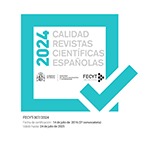Alfabetización em datos: percepción y grados de satisfacción de estudiantes universitarios
Resumen
Este artículo presenta los resultados obtenidos de un estudio realizado en el marco de un Proyecto de Innovación Docente sobre alfabetización en datos, desarrollado en cinco titulaciones de grado de la Universidad de Salamanca, con el objeto de conocer la percepción y el grado de satisfacción de los estudiantes universitarios respecto a la búsqueda y recuperación de datos abiertos. Se ha aplicado el enfoque metodológico cuantitativo no experimental, empleando técnicas estadísticas, descriptivas e inferenciales. Se ha hecho una selección muestral por disponibilidad accediendo a 310 discentes de las ramas de conocimiento Ciencias Sociales y Jurídicas, y Artes y Humanidades. El instrumento de recogida de datos ha sido un cuestionario conformado por preguntas de respuesta cerrada y abierta, referidas a las variables que se pretendía estudiar. Los resultados obtenidos han permitido identificar las dificultades que encuentran los estudiantes en cuanto a la elección de la fuente de datos, la ejecución del proceso de búsqueda de información y la comprensión de los dataset. Asimismo, ponen de manifiesto cómo los discentes valoran positivamente la formación en datos y su utilidad en el aprendizaje de otras asignaturas, así como en su vida profesional. El estudio efectuado ha obtenido evidencia empírica acerca del nivel de percepción y satisfacción que poseen los estudiantes de grado en cuanto a la alfabetización en datos. Además, ha expuesto la necesidad de incorporar esta competencia transversal en la formación universitaria y de promover la, hasta ahora, limitada investigación sobre el uso potencial que tienen los datos abiertos en el aprendizaje.
Descargas
Descarga artículo
Licencia
La Revista General de Información y Documentación, para fomentar el intercambio global del conocimiento, facilita el acceso sin restricciones a sus contenidos desde el momento de su publicación en la presente edición electrónica, y por eso es una revista de acceso abierto. Los originales publicados en esta revista son propiedad de la Universidad Complutense de Madrid y es obligatorio citar su procedencia en cualquier reproducción total o parcial. Todos los contenidos se distribuyen bajo una licencia de uso y distribución Creative Commons Reconocimiento 4.0 (CC BY 4.0). Esta circunstancia ha de hacerse constar expresamente de esta forma cuando sea necesario. Puede consultar la versión informativa y el texto legal de la licencia.











